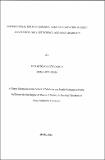| dc.description.abstract | Nursing education forms the basis of professional existence, development and sustainable future. The purpose of this study was to establish how nurse educators adapted to increased instructional workload, how they were self-sufficient in performing, and how they would sustain instructional roles in diploma nursing training in colleges within Meru. Forty six nurse educators participated in the study by availability, willingness to participate and giving a signed consent. A descriptive cross-sectional study design was carried out using a self-administered questionnaire for data collection after a pilot study showed validity and reliability of the tool. Data was collected after consent appointments with the principals and respondents of the participating colleges and was analysed using descriptive statistics performed at 95% confidence interval. The findings are presented in tables, bar graphs, pie charts and a discussion. The study found out that nurse educator to student nurse ratio was 1:20 which indicated instructional role overload. It was evident that there was role overload, teamwork challenges, lack of a mentoring program for novice faculty, and limited role orientation before role assignment. Educators had adequate adaptation mechanisms in planning, adjustment of instructional plans and taking in arising additional instructional roles. Adequate commitment to instructional roles and long service in the same diploma nursing training institution were indicators of self-sufficiency. Adequate adaptation mechanisms and self-sufficiency were indicators of sustainable instructional role performance. The recommendations made were; diploma nursing training institutions to recruit more nurse educators, ensure an orientation program for inducing novice faculty to institutional culture of performing the instructional roles, encourage and ensure planning and execution of plans for instruction and solve instructional challenges as a team for continuity/sustainability of diploma nurse training and education. | en_US |

